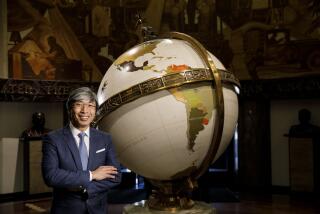OneLegacy issued a statement on an L.A. Times investigation; The Times responds
- Share via
OneLegacy, a large organ and human-tissue procurement group in Los Angeles, said in a news release last week that Los Angeles Times stories that mentioned its operations had inaccuracies that could create “unsubstantiated mistrust” in the donation system. The news release refers to a two-part investigation The Times published Oct. 13 and 14.
That report detailed how companies that procure human organs, bones and other parts set up operations in county morgues across the country to gain access to more bodies. In some cases, procurement teams are taking body parts before coroners are able to conduct an autopsy, even in the midst of sensitive investigations such as possible homicides. The Times found dozens of cases across the country in which coroner investigations were complicated or upended by procurement of parts.
“The Times stands firmly behind these important stories, which were the product of months of meticulous reporting and careful editing,” said Scott Kraft, managing editor of The Times.
Here is a summary of OneLegacy’s statements and The Times response:
OneLegacy:
OneLegacy obtained approval from the L.A. County medical examiner-coroner to procure organs or tissues in “100% of the two dozen cases” reporters asked its executives about.
The Times response:
At least two autopsy reports stated explicitly that OneLegacy had not asked the medical examiner for permission to recover organs or tissues. And OneLegacy previously told The Times it had no information on two other cases.
OneLegacy:
The Times used “fictitious prices” in a diagram showing how much body parts are worth.
The Times response:
The prices on the diagram, as the accompanying description explained, came from invoices received by hospitals, which had paid for the processed human tissue products. Reporters received the invoices from public hospitals after filing requests for the records.
OneLegacy:
OneLegacy did not profit from tissues such as bone or skin and it lost an average of $197 on each tissue donor in 2018.
The Times response:
There is no way to verify OneLegacy’s claim, and The Times stories did not discuss profits or losses for tissues harvested by OneLegacy. OneLegacy’s most recent federal tax filing does not break out expenses for organ or tissue work. It shows that OneLegacy’s overall revenues, including $89.6 million from organ and tissue procurements, exceeded expenses by $7.7 million in 2017. That increased the value of its net assets to more than $65 million.
OneLegacy:
OneLegacy’s tissue partners do not produce nor market for cosmetic use. “Uncontrollable physician ‘off-label’ cosmetic use” is less than 1% of OneLegacy’s tissue recoveries. OneLegacy said it received that information from the companies it currently sends tissue to.
The Times response:
The Times stories noted that human tissue is increasingly used for cosmetic surgery. Processed tissue also has many other uses, including skin for burn patients, tendons for athletic injuries and bone for spinal surgeries. There is no public reporting of how much tissue recovered during harvesting is used for cosmetic purposes. Two national trade groups for tissue and organ procurement companies told The Times that the industry does not track that information.
More to Read
Inside the business of entertainment
The Wide Shot brings you news, analysis and insights on everything from streaming wars to production — and what it all means for the future.
You may occasionally receive promotional content from the Los Angeles Times.











